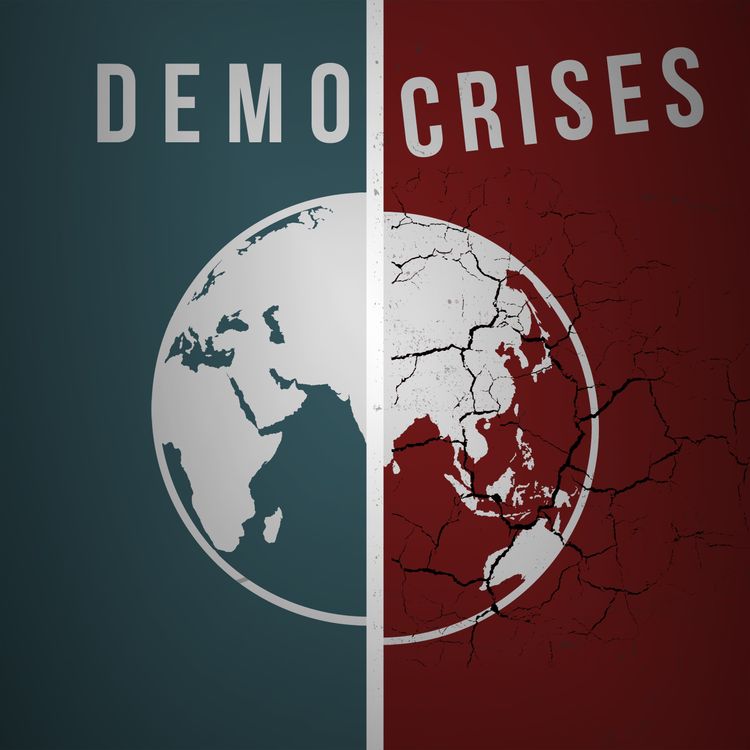Share

Democrises
Episode 8: The Rise and Fall of Political Ideologies Over Political Time
Season 1, Ep. 8
•
Why was Ronald Reagan as successful as FDR, Lincoln, and Andrew Jackson? Why was George W Bush such a divider like James K Polk, Lyndon B Johnson, and John Adams? How is Trump like Carter, Hoover, Pierce, and Quincy Adams? This episode traces the famous theory of Yale Professor Stephen Skowronek, about how political ideologies have risen and collapsed in American political history. Skowronek’s theory, first published in 1992, predicted many of the challenges experienced by all Presidents since then: Clinton’s impeachment, Bush’s “dubious wars,” Obama’s Tea Party Backlash and Trump’s absurdity. The theory also predicts what comes next.
More episodes
View all episodes

13. Episode 13 -- BONUS: Interview with Dr. Rebecca Costa, Author and Sociobiologist
46:19||Season 1, Ep. 13Sociobiologist and futurist Rebecca Costa worked in Silicon Valley for four decades at the cutting edge of technology before moving on to study why civilizations collapse. Her books describe a grave concern for our modern world: that when societies become too complex for average people, they abandon rational solutions in favor of irrational and unproductive beliefs. We discuss how technology like artificial intelligence may be the key to avoiding a collapse, or at least a radical correction.
12. Episode 12 -- BONUS: What is a Type-I Civilization?
42:17||Season 1, Ep. 12A Type-I civilization is a planetary civilization that harnesses enough energy from its parent star to achieve sustainability. We discuss the energy requirements to achieve Type-I status on Earth, and it's not as much as you think. After some astronomy, philosophy, and history, we show how the three global Democrises must be overcome in the next few decades if we are to achieve Type-I status. The fact that we haven't detected any signs of intelligent life in the universe -- any Type-I or Type-II civilizations -- ominously suggests that the nature of intelligent life may be to destroy itself. But we can chart a different course.
11. Episode 11: Institutional Solutions to Our Democrisis
39:02||Season 1, Ep. 11Our nation and world are in crisis, far more than we care to admit. Our problems are accelerating, and our institutions are not performing up to the task. Just because we have the world's best car (and do we?), we have obvious defects that we must improve. In our season finale, we present institutional solutions to solve gerrymandering, campaign finance, and electoral reform. We tell the story of New Zealand, which overcome minority rule by a brash right-wing populist, through maturely pursuing electoral reform. It won't be easy, but that doesn't mean it's impossible.
10. Episode 10: Interview with Ed Luce, Author and Financial Times Columnist
29:17||Season 1, Ep. 10Financial Times columnist Ed Luce wrote in 2012 that the hollowing out of the American middle class meant that America's trajectory was worse than it looked. He recognized "America First" in the Tea Party. Now, he notes that the "Latin-Americanization" of the American economy (widening inequality) has led to the election of a Latin-American style populist. We examine reasons that things have gotten so much harder in the last 30 years in America, and invoke lessons from Britain, France, and Germany.
9. Episode 9: Solving Tribalism with Shakespeare, Game Theory, and Counterinsurgency
45:06||Season 1, Ep. 9Tribalism has mortally afflicted humanity since tribes evolved eons ago, and today it threatens to tear down many nations. We know why we’re tribal, but how do we solve it, aside from civil war? William Shakespeare offers one solution. John Nash offers another. General Petraeus offered a third. Let’s put them all into one theory.
7. Episode 7: Of Mavericks and Muckrakers
52:57||Season 1, Ep. 7Teddy Roosevelt and John McCain were both war heroes, beloved by media elites, named after their father, and of the same military rank. Each maverick abhorred the Democrats’ growing fondness for socialism, and revered the Republican giants of old. However, he found he not only had to fight bad ideas from Democrats; a majority of his own party was also inflexibly infatuated with outdated ideologies. What can the parallel insurgencies of Teddy Roosevelt and John McCain against their GOP establishments teach us about standing up to bad Republicans today?
6. Episode 6: Midterm Election Special & How to Fix the Senate
33:00||Season 1, Ep. 6Rob Cohen gives his thoughts on the 2018 Midterms and weighs in on solutions to fix the US Senate.
5. Episode 5: Interview with Christine Woodhouse, Director of One Vote
44:19||Season 1, Ep. 5Every vote tells a story about the person who cast it, and about his or her country. In the past and in the present, people keep having to overcome obstacles in order participate in democracy. In a world growing skeptical, what does one vote mean to the people who cast it? Lawyer Christine Woodhouse, director of the film One Vote, discusses her film and what it taught her about the many intrinsic values in the vote.